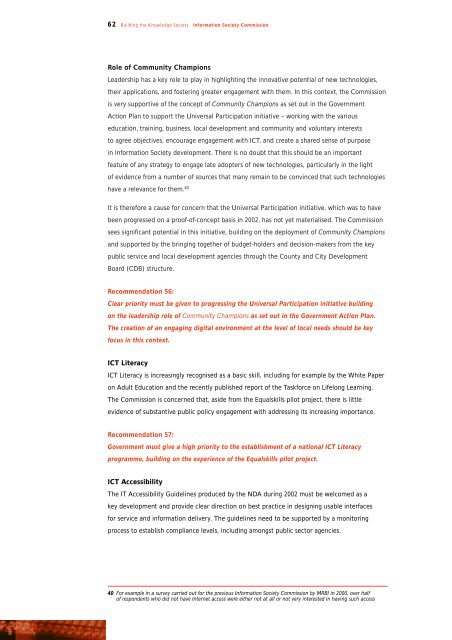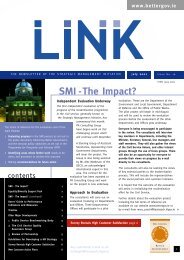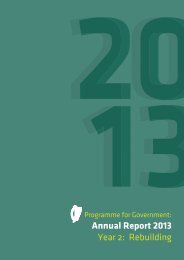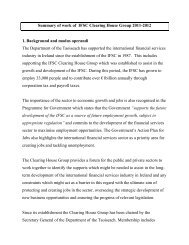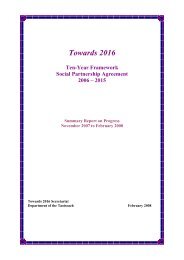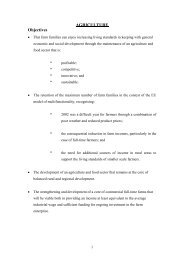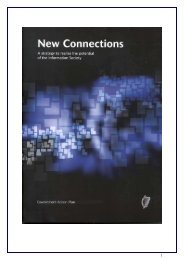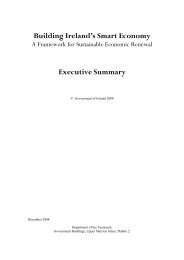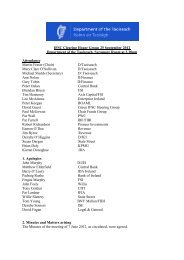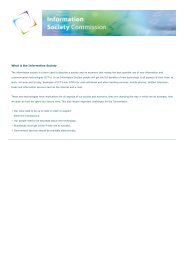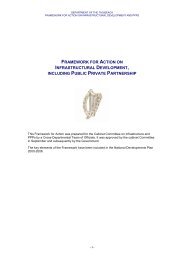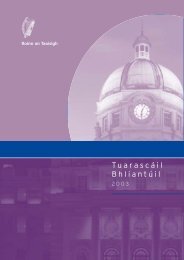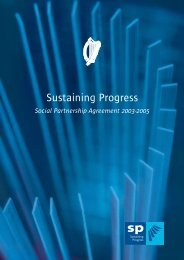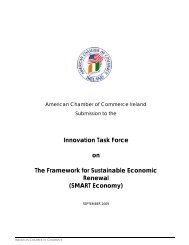Building the Knowledge Society - Department of Communications ...
Building the Knowledge Society - Department of Communications ...
Building the Knowledge Society - Department of Communications ...
You also want an ePaper? Increase the reach of your titles
YUMPU automatically turns print PDFs into web optimized ePapers that Google loves.
62 <strong>Building</strong> <strong>the</strong> <strong>Knowledge</strong> <strong>Society</strong> Information <strong>Society</strong> CommissionRole <strong>of</strong> Community ChampionsLeadership has a key role to play in highlighting <strong>the</strong> innovative potential <strong>of</strong> new technologies,<strong>the</strong>ir applications, and fostering greater engagement with <strong>the</strong>m. In this context, <strong>the</strong> Commissionis very supportive <strong>of</strong> <strong>the</strong> concept <strong>of</strong> Community Champions as set out in <strong>the</strong> GovernmentAction Plan to support <strong>the</strong> Universal Participation initiative – working with <strong>the</strong> variouseducation, training, business, local development and community and voluntary intereststo agree objectives, encourage engagement with ICT, and create a shared sense <strong>of</strong> purposein Information <strong>Society</strong> development. There is no doubt that this should be an importantfeature <strong>of</strong> any strategy to engage late adopters <strong>of</strong> new technologies, particularly in <strong>the</strong> light<strong>of</strong> evidence from a number <strong>of</strong> sources that many remain to be convinced that such technologieshave a relevance for <strong>the</strong>m. 40It is <strong>the</strong>refore a cause for concern that <strong>the</strong> Universal Participation initiative, which was to havebeen progressed on a pro<strong>of</strong>-<strong>of</strong>-concept basis in 2002, has not yet materialised. The Commissionsees significant potential in this initiative, building on <strong>the</strong> deployment <strong>of</strong> Community Championsand supported by <strong>the</strong> bringing toge<strong>the</strong>r <strong>of</strong> budget-holders and decision-makers from <strong>the</strong> keypublic service and local development agencies through <strong>the</strong> County and City DevelopmentBoard (CDB) structure.Recommendation 56:Clear priority must be given to progressing <strong>the</strong> Universal Participation initiative buildingon <strong>the</strong> leadership role <strong>of</strong> Community Champions as set out in <strong>the</strong> Government Action Plan.The creation <strong>of</strong> an engaging digital environment at <strong>the</strong> level <strong>of</strong> local needs should be keyfocus in this context.ICT LiteracyICT Literacy is increasingly recognised as a basic skill, including for example by <strong>the</strong> White Paperon Adult Education and <strong>the</strong> recently published report <strong>of</strong> <strong>the</strong> Taskforce on Lifelong Learning.The Commission is concerned that, aside from <strong>the</strong> Equalskills pilot project, <strong>the</strong>re is littleevidence <strong>of</strong> substantive public policy engagement with addressing its increasing importance.Recommendation 57:Government must give a high priority to <strong>the</strong> establishment <strong>of</strong> a national ICT Literacyprogramme, building on <strong>the</strong> experience <strong>of</strong> <strong>the</strong> Equalskills pilot project.ICT AccessibilityThe IT Accessibility Guidelines produced by <strong>the</strong> NDA during 2002 must be welcomed as akey development and provide clear direction on best practice in designing usable interfacesfor service and information delivery. The guidelines need to be supported by a monitoringprocess to establish compliance levels, including amongst public sector agencies.40 For example in a survey carried out for <strong>the</strong> previous Information <strong>Society</strong> Commission by MRBI in 2000, over half<strong>of</strong> respondents who did not have Internet access were ei<strong>the</strong>r not at all or not very interested in having such access


